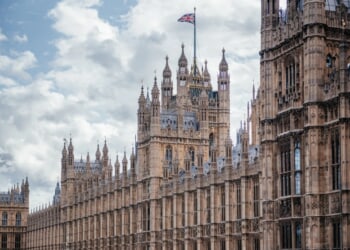Dr Samuel Hughes is Director of Housing at the Centre for Policy Studies.
In yesterday’s article, I set out some of the advantages of the Planning and Infrastructure Bill. But this isn’t the whole story. In this article, I outline one worrying provision in the Bill, and several provisions that should have been included by a Government that wants to unlock development at scale.
The Bad: Compulsory Purchase
The most worrying change in the bill is probably the measures on compulsory purchase. Compulsory purchase is an extremely important institution, which has been indispensable for most infrastructure delivered in Britain for at least three hundred years.
But it is understandably contentious. British people tend to have a lively sympathy for those whose homes are compulsorily purchased; a granny being evicted from her cottage by road-building planners is one of the rare events that will unite Guardian and Express readers in a common cause.
Sophisticated advocates of compulsory purchase therefore generally advocate that it should be used very selectively, and that its victims should be compensated as generously as possible. Only thus can its continuing legitimacy as an institution be secured.
It is thus worrying that the Government proposes to make it easier for councils to compulsorily purchase land at a price that excludes its ‘hope value’ – the value that land has in virtue of people’s hope that it might get planning permission for some kind of development.
One problem with excluding hope value from compensation is that hope value obviously wasn’t excluded from the price that owners paid for their land. So when councils compulsorily purchase land without paying for its hope value, some of previous owners will be financially ruined, because the compensation they receive after compulsory purchase is lower than what they paid for their property in the first place.
In the past, similar institutions generated horrible and tragic stories, undermining the legitimacy of compulsory purchase generally.
It is particularly striking that these compulsory purchase powers cover not only agricultural land, but also homes. Does the Government realise how the public will respond when ordinary people are financially ruined while their homes are demolished?
I suspect that the inclusion of people’s homes may prove a particular point of controversy in Parliament, and I hope it is amended out of the final draft of the Bill.
The main weakness of the Bill, however, is not what it includes, but what it doesn’t.
Miss Chance 1) Quangos
The Government needs to take back some key powers from quangos. Here is one example. The Government is currently trying to build a new town at Ebbsfleet, in Kent. At a late stage of the project, Natural England declared the site of the planned town centre to be ‘Site of Special Scientific Interest’, partly because of the presence of some unusual kinds of spider.
As a result 1,400 homes and an urbanistically-vital town centre, clustered around a high-speed railway station, were effectively banned at a stroke.

It may or may not be that development should happen near Ebbsfleet Station. But what is clear is that this decision involves balancing competing goods, and therefore that it needs to be made by the legitimate government – not by a quango whose legal responsibility is to care only about a good of a single kind.
The Government should take back the power to de-designate SSSIs where it believes it to be in the overall good of the country to do so. The current legal situation around this is highly unclear, and ministers should take the opportunity offered by the Bill to resolve it.
This principle should be applied across planning. It is fine for single-issue organisations to advise government on the impacts of its decisions. But final decisions involve balancing between the goods that each single-issue body focusses on, and those decisions nearly always need to lie with the government itself.
Missed Chance 2) Judicial Review
The Government needs to reform hazy laws that create opportunities for constant judicial review of infrastructure projects. Many people write as though judicial review is in itself a problem, but this is a mistake: incessant judicial review is only possible because of excessively vague or complicated laws that create constant ambiguity over whether a given decision was lawful or not.
The solution is not stopping judicial review per se, but reforming the unclear laws that give rise to it. Some such reforms would be controversial.
But others would not. Many judicial reviews are occasioned by two very obscure and technical areas of law, namely rules concerning consultation and legitimate expectations.
These are so dry and technical that I am not going to try to explain them here (if you are curious, see this report). But the very fact that these areas are so obscure is a good reason to think that the Government could reform them without significant political cost.
Missed Opportunity 3) Aarhus
More controversially, the Government should reform Britain’s Aarhus Convention rules. It is an ancient principle of English civil law that the wrongful party pays the legal costs of the wronged one. This principle has applied for centuries, and still applies in virtually all contexts.
But there is a strange exception for environmental campaigners, who are only required to bear up to £10,000 of the (frequently enormous) legal costs of bodies they have wrongfully sued.
This exception exists because of an obscure agreement Britain signed called the Aarhus Convention – although, as often happens, we have interpreted the Convention more zealously than many of its other signatories.
These rules have enormous indirect costs for the British public because they allow campaigners to delay infrastructure projects without bearing any of the costs of doing so. The Government should reform them, and the Planning and Infrastructure Bill would have been an ideal vehicle for this.
—
The Planning Infrastructure Bill is not, then, as good as it could be. But it is still, on balance, a good piece of legislation. It supports Labour’s claim to be the party of building, although it does not make that status invincible.
Much depends on how the Conservatives choose to respond. They could attack the Bill for going too far, lending credibility to Labour’s pro-building status. Or they could attack it for not going far enough, and stake their own claim to the title. Which way they go may be of considerable importance for Britain’s future.






![Trump's Admin Guts Another ‘Rogue Government Agency with Zero Accountability’ [WATCH]](https://www.right2024.com/wp-content/uploads/2025/03/Trumps-Admin-Guts-Another-‘Rogue-Government-Agency-with-Zero-Accountability-350x250.jpg)
![‘We All Owe Him (Elon) a Huge Debt of Gratitude’ [WATCH]](https://www.right2024.com/wp-content/uploads/2025/03/‘We-All-Owe-Him-Elon-a-Huge-Debt-of-Gratitude-350x250.jpg)









